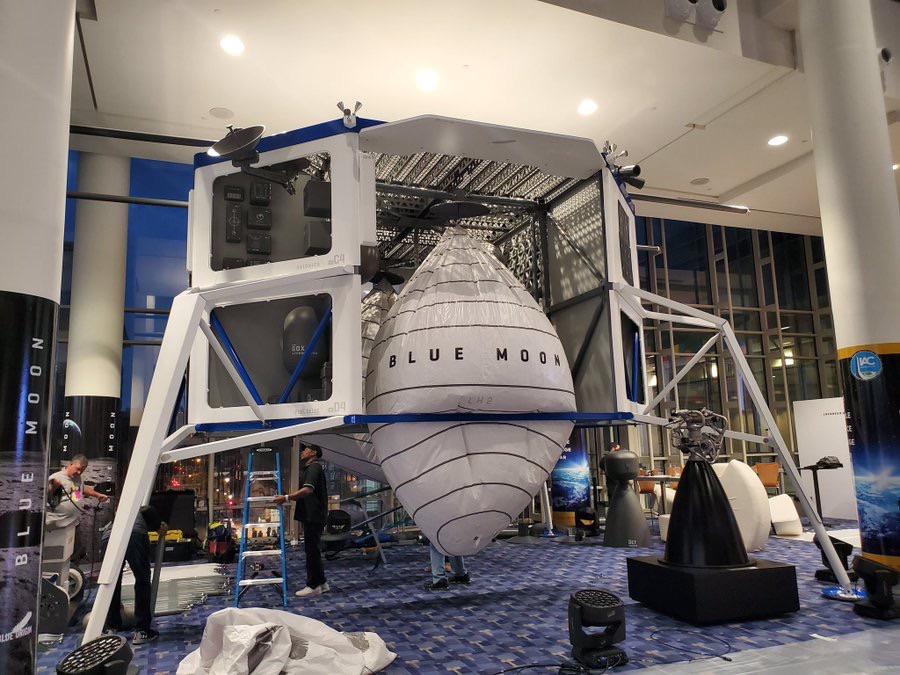
With the publication of the open letter to Jeff Bezos from his employees , Jeff Bezos is continuing to have a Terrible, Horrible, No Good, Very Bad Year. Despite the hopes of many in the space community to see rich competition amongst private space industries (since the government ones are moribund), Blue Origin’s completely inability to do, well, anything, has dashed those hopes. SpaceX is clearly the winner and all Elon Musk had to do was to uncharacteristically say nothing.
And Bezos' woes are self-inflicted.
Note: All of the following is grossly over-simplified.
I often talk about SpaceX and Blue Origin with friends and many are surprised to find out that Jeff Bezos founded Blue Origin in 2000 , two years before Musk created SpaceX. Bezos has been pouring a billion dollars a year into Blue Origin while SpaceX came close to bankruptcy several times in its early years. Blue Origin follows a traditional, slow process of incremental advances, while SpaceX is applying agile project management to rockets. Insane!
And SpaceX is destroying Blue Origin. Just this year, SpaceX has had more flights than Blue Origin has had in over 20 years. And I’m being generous by counting Blue Origin’s test flights. Further, SpaceX is far cheaper than all of its competitors and it looks like its rockets are just as reliable, if not more so, than most of its competitors.
So where did Bezos go wrong?
Blue Origin has been rather quiet about their actions, so many things in the early years are speculative, but they did manage to get a small rocket named Goddard to fly to 85 meters in 2006 . And for the next few years, that was kind of it. This is probably a contributing factor to Blue Origin president Rob Myerson leaving the company in 2017 . Bob Smith of Honeywell was brought on board and, well, we’ll get back to him.
In 2006, the United Launch Alliance (ULA), was formed as a joint venture between Lockheed Martin Space and Boeing Defense. Prior to this, there was an a hope of increased competition between competitors that would lower the costs of space launches. Instead, Lockheed Martin Space and Boeing found a way to sidestep competition.

Later, in 2014, facing the prospect of the upstart SpaceX starting to cut into their market share, ULA decided to gamble and buy BE-4 rocket engines from Blue Origin. Was this to prop up a competitor? Was this to have access to cheaper rockets? Did they think they couldn’t do this themselves? Who knows what their reasoning was, but their gamble failed. The BE-4 engines were to be ready by 2017. The US Department of Defense was looking forwad to ULA’s Vulcan rocket launching with US-made BE-4s instead of the Atlas V rockets launching with Russian-made RD-180 engines.
As of 2021, ULA is still waiting for the BE-4 engines. Of course, it doesn’t help that, with limited experience, Blue Origin agreed to make some of the most difficult rocket engines you can make. The SpaceX initial rockets would never have passed DoD muster.
So, not many flights. Can’t deliver engines. What would you do in Bezos' position?
Well—and this is admittedly before the BE-4 debacle—in late 2011 when Blue Origin was struggling to deliver anything and SpaceX was picking up NASA contracts (thanks, in large part, to the hard work of Gwynne Shotwell), Bezos decided that the only reasonable thing to do was to start working on the New Glenn rocket . But not a modest version as was earlier planned, but a huge version to rival the Saturn V in height. Suddenly, Blue Origin’s engineers were tasked with creating one of the biggest rockets of all time. Oh, it had to work perfectly the first time. There was no learning curve for Blue Origin. There was a learning cliff and Blue Origin lemmings were being herded over it by Bezos.
Call it a hunch. But maybe, maybe, Blue Origin should have learned to finish something before starting on such an astronomical goal.
So clearly Rob Myerson had to leave, but who’s Bob Smith?
Bob Smith was the man that Bezos picked to run Blue Origin. He has an impressive resume , including a doctorate in aerospace engineering, a business degree from MIT, and many years of experience building rockets. He should be perfect.
Instead, it’s overwhelmingly agreed by everyone outside of Blue Origin that Smith has been a micromanaging disaster. On Glassdoor, 91% of SpaceX employees approve of the CEO . For Blue Origin, only 22% approve of the CEO . For most companies burning cash instead of rocket fuel, having a CEO in place for four years with little to show except demoralized employees and an insanely high staff turnover rate , the CEO would be out the door.
This Ars Technica article sums things up nicely :
As Blue Origin has fallen behind SpaceX in recent years, morale has declined, according to multiple sources. Bezos pushed the company further from its roots in late 2017 by sidelining long-time president Rob Meyerson and hiring a traditional aerospace veteran, Bob Smith, to become chief executive. Coming from Honeywell, Smith instituted a more bureaucratic management style, and Blue Origin’s progress seemed to slow significantly. Whereas Bezos' debut flight on New Shepard could have occurred as early as 2019, it slipped by months and eventually years. Critics of Smith’s plodding management style started referring to the company as “Blue Honeywell.”
Jeff Bezos is going to fire Bob Smith. We don’t know when. The only question is why he hasn’t done it yet.
It’s almost as if even Bezos doesn’t believe in Blue Origin’s mission.
I want Blue Origin to succeed. I want Jeff Bezos' company to be one of the most wildly successful companies in history, alonside SpaceX, Rocket Lab, and any other company that’s try to push humanity into space. We need competition here. But where is it? ULA is hanging on with government contracts. Roscosmos wants out of the ISS because they’re so strapped for cash. The ESA and EU are trying to force EU countries to only buy from Arianespace, but the cracks are beginning to show . Honestly, Blue Origin could have been the one to watch in this space. And now we’re watching them, but not for the reasons they wanted.

Ironically, part of the issue seems to be that Blue Origin employees know that Bezos won’t stop spending. The money won’t stop arriving. They discuss this in articles, in the Glassdoor ratings, and common sense reinforces this: SpaceX was lean and hungry, Blue Origin has never been either. Like many startups who are flush with cash and fail because they can’t keep their eye on the ball, Blue Origin has no reason to push hard.
And now, Blue Origin’s lawsuit against NASA is destroying their last opportunity to succeed . NASA, uncharacteristically, has slammed Blue Origin. If you’re unfamiliar with the lawsuit, NASA solicited bids for their 2024 moon lander. Blue Origin’s bid was ridiculously over NASA’s budget and NASA rejected it. So while SpaceX at one point sued the government for the right to compete, Blue Origin is suing because they couldn’t compete.
Here are a couple of tidbits from that article:
Blue Origin was “able and willing” to offer NASA a lower price for its lunar lander but chose not to because it expected NASA to ask and negotiate for a lower price first, the attorneys allege, citing a six-page declaration written by the company’s senior vice president Brent Sherwood in April.
Given that Blue Origin has not demonstrated a track record of being able to repeatedly fly to and from space, why on earth (heh) would Blue Origin think they were a front-runner in the bid or that NASA would come back to negotiate? When NASA, unsuprisingly, said “no”, Blue Origin went to the GAO (Government Accountability Office) and complained it was unfair. The GAO also told Blue Origin “no.” So Blue Origin sued.
Worse, because the lawsuit has halted much of the moon landing program, NASA lawyers wrote the following:
“What begins as a mere procurement delay all too easily turns into a lack of political support, a budget siphoned off for other efforts, and ultimately, a shelved mission.”
We’ve been waiting fifty years to get back to the moon. Blue Origin decided that their pride was more important than the dreams of the American people. It’s not like the fate of their company hangs on this: Bezos won’t stop spending, but they’ve dug themselves a deep hole, lost the goodwill of the American people, and as NASA insiders have said, they’re unlikely to get any government contracts after this stunt.
Seriously, Mr. Bezos, if you believe in your stories about space industry, its time to fire Bob Smith and bring in someone who can fix this damned mess. Everyone already knows he’s gone. Let’s get this done and give Blue Origin a chance to compete.


